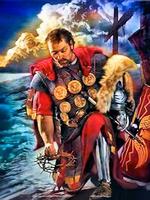Fathers of the Church
Epistle XLIV: to John, Bishop
by Gregory the Great in 590-604 | translated by James Barmby, D.d
Gregory to John, Bishop of Syracuse.
Although there may have been cause to provoke the spirit of your Fraternity not unreasonably to anger, so that you would neither receive the offerings of the lord Venantius nor allow the sacred solemnities of mass to be celebrated in his house, yet, inasmuch as our earthly interests should be prosecuted in such a manner that no quarrel may avail to sever us from the bond of charity, we therefore exhort your Holiness, as we have already written, that you should both receive the offerings of the aforesaid man with all sweetness and God-pleasing sincerity, and allow the mysteries of the mass to be performed in his house; and that, as we have written, you should, if perchance he should wish it, go there in person, and by celebrating mass with him renew your former friendly feeling. For it is your duty to bestow priestly affection on sons, though still m causes that may arise, by no means to pretermit, as reason approves, the jurisdiction of your Church. Wherefore, considering this, it is necessary that your Fraternity should try so to demean yourself with discreet moderation with respect to these matters as both to transact advantageously what the nature of the business requires, and not to recede from the grace of paternal charity.
Taken from "The Early Church Fathers and Other Works" originally published by Wm. B. Eerdmans Pub. Co. in English in Edinburgh, Scotland, beginning in 1867. (LNPF II/XII, Schaff and Wace). The digital version is by The Electronic Bible Society, P.O. Box 701356, Dallas, TX 75370, 214-407-WORD.






